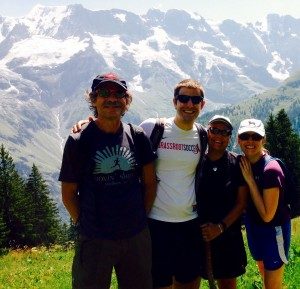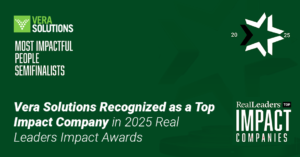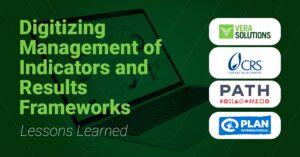Co-Founder and CEO Zak Kaufman reflects on his path to and with Vera. When he’s not immersed in new technology and data systems, you can find Zak hiking in the mountains, cross-country skiing, or lacing up on the Ultimate Frisbee field. The interview below is the latest post in an ongoing series highlighting our team’s respective paths to Vera.

What motivated you to pursue social impact work?
My parents. My mother is retired pediatric nurse practitioner; my father a public school teacher and coach. Through the impact they had on thousands of young people in our community in Wisconsin, they instilled in me a desire to use my time, skills, and sweat to make a difference in the lives of others. I believe that every generation has a responsibility to leave our world healthier, more prosperous, and more equitable than we found it. Numerous communities and institutions have nurtured that belief throughout my life—from my high school cross-country team and Dartmouth’s William Jewett Tucker Foundation to the Truman Scholar and Marshall Scholar communities—but my parents definitely set me on the track initially.
Who inspires you?
My teammates. I’m constantly impressed by the diligence, intelligence, and passion they bring into their work every day. And, of course, I’m inspired by the organizations we serve and their commitment to solving the biggest challenges facing the world today. I admire the depth of organizations like Shining Hope for Communities, who work in Nairobi’s slums ensuring some of Kenya’s most vulnerable women and girls have access to quality education, primary care, clean water, and opportunities for empowerment. I admire the innovation of organizations like Building Markets, who support the advancement of local entrepreneurs and enterprises in Liberia and Myanmar. I admire the reach, breadth, and obsession with continued improvement of organizations like TechnoServe—who work to improve the lives and wellbeing of farmers in 29 countries—and the Aga Khan Foundation, who strengthen education, civil society, rural development, and health in hundreds of communities across Central Asia and East Africa.
In 2009, I saw first-hand how data systems can either cripple or propel high-impact organizations. That is what inspired me to shift my personal focus from direct service delivery and research towards amplifying the impact of those already driving social change.
What experience really shaped your values and goals?
At 19, I left U.S. borders for the first time to work on a medical team in rural Nicaragua. Until then, society had told me that the way to make a difference in the world with a scientific brain was to become a medical doctor – that success beyond college meant getting into a top medical school. But the experience in Nicaragua reshaped my aspirations.
Serving more than 500 patients, we treated everything from scabies to parasites and I became adept at explaining diagnoses and treatments to our patients. I volunteered to help analyze data from the clinic intake forms; we learned that roughly one-third of the patients had gastrointestinal problems, that 60% of the region’s habitants lacked access to clean drinking water, and that a disproportionate number of women and children were suffering from respiratory infections (caused by inhalation of indoor smoke). These learnings shifted the next year’s team’s plans – they focused more on prevention efforts, like distributing ceramic water filters and building clean cookstoves.
The overall experience taught me two crucial lessons. First, it taught me, while still a teenager, the importance of strong data systems and feedback loops. I saw first-hand how systematic, strategic data collection and analysis could lead to better plans, better decisions, and ultimately better outcomes. Second, it moved my professional goalposts, instilling in me a newfound passion for public health and disease prevention. This led me into five years of HIV prevention work in Latin America and Southern Africa and later to complete a PhD in Epidemiology at the London School of Hygiene and Tropical Medicine.
That experience—from running paper-based surveys in the Dominican Republic to monitoring a multi-country, USAID-funded health education program to overseeing randomized controlled trials in South Africa and Zimbabwe—exposed me to the weaknesses plaguing NGO data management systems, particularly those used for monitoring and evaluation. But my partners and I saw an incredible opportunity in those weaknesses and that’s what inspired us to create Vera.
How do your values feed into your work at Vera?
When I was an adolescent, my mother taught me about Tikkun Olam – a Jewish value literally meaning “to repair the world.” She engrained in me this idea that humans have a responsibility to improve our planet, to never stop working towards justice and peace. Now, Vera is not focused in any way on religion, but I can’t help but recognize that this concept of Tikkun Olampermeates everything we do. Our ‘repair work’ begins with the organizations we work with – those fighting disease, alleviating poverty, advancing education, combatting inequalities, and protecting the environment – and the people who join Vera. To protect our own social mission, we only work with organizations whose impact we believe in; we only work with those for whom we can move the needle; and we only hire staff who are passionate about improving the way the social sector operates. Compromising on any of those fronts means compromising on impact, our number-one value.
Some companies ‘give back’ to charity for the optics of altruism. For the most part, they, too, are performing a part in tikkun olam. Vera’s approach is different, however, in that we don’t seek to ‘take’ in the first place. Every project we dig into seeks a quadruple-win:
- Our clients benefit through stronger systems, more informed decisions, and saved time, money, and headaches;
- Our staff benefit through rich learning experiences and new or improved skillsets;
- Vera as a company benefits by building our portfolio and reputation, and by fueling our growth; and
- The world benefits through the improved health, education, economic, and/or environmental outcomes achieved by our clients.
We seek to play a part in repairing the world on all four fronts—not just by literally repairing broken data systems and by helping organizations achieve more impact, but also by training the next generation of social sector change agents and by illustrating a new way of doing business in which altruism is the primary goal rather than a nice-to-have, tertiary byproduct. That’s why we chose to become a certified B Corporation – because we’re accountable to delivering value to a wide range of stakeholders, not to generating profit for a small group of shareholders. Imagine what the world would look like if businesses and individuals could only do ‘well’ if they were proportionally doing good…






